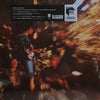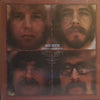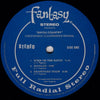





Creedence Clearwater Revival – Bayou Country (Half Speed Mastering)
Creedence Clearwater Revival [click here to see more products featuring Creedence Clearwater Revival]
Vocals, lead guitar, harmonica - John Fogerty [click here to see more products featuring John Fogerty]
Rhythm guitar - Tom Fogerty
Bass – Stu Cook
Drums – Doug Clifford
Arranged by John Fogerty
Written by John Fogerty (A1-3, B2-4), Robert "Bumps" Blackwell & John Marascalco (B1)
1 LP, standard sleeve
Original analog Master Tape : YES
Heavy Press : 180g
Record Color : Black
Speed : 33 RPM
Size : 12’’
Stereo
Studio
Record press: Optimal Media GmbH
Label: Craft Recordings
Original Label : Fantasy
Recorded in October 1968 at RCA Studio, Hollywood, California
Engineered by Hank McGill
Produced by John Fogerty
Mastered by Miles Showell at Abbey Road Studios
Cover art by Basul Parik
Liner notes by Joel Selvin
Photography by Malcolm Barker, Basul Parik
Originally released in January 1969
Reissued in 2024
Tracks:
Side A:
1. Born On The Bayou
2. Bootleg
3. Graveyard Train
Side B:
1. Good Golly Miss Molly
2. Penthouse Pauper
3. Proud Mary
4. Keep On Chooglin'
Reviews :
"Opening slowly with the dark, swampy "Born on the Bayou," Bayou Country reveals an assured Creedence Clearwater Revival, a band that has found its voice between their first and second album. It's not just that "Born on the Bayou" announces that CCR has discovered its sound -- it reveals the extent of John Fogerty's myth-making. With this song, he sketches out his persona; it makes him sound as if he crawled out of the backwoods of Louisiana instead of being a native San Franciscan. He carries this illusion throughout the record, through the ominous meanderings of "Graveyard Train" through the stoked cover of "Good Golly Miss Molly" to "Keep on Chooglin'," which rides out a southern-fried groove for nearly eight minutes. At the heart of Bayou Country, as well as Fogerty's myth and Creedence's entire career, is "Proud Mary."
A riverboat tale where the narrator leaves a good job in the city for a life rolling down the river, the song is filled with details that ring so true that it feels autobiographical. The lyric is married to music that is utterly unique yet curiously timeless, blending rockabilly, country, and Stax R&B into something utterly distinctive and addictive. "Proud Mary" is the emotional fulcrum at the center of Fogerty's seductive imaginary Americana, and while it's the best song here, his other songs are no slouch, either. "Born on the Bayou" is a magnificent piece of swamp-rock, "Penthouse Pauper" is a first-rate rocker with the angry undertow apparent on "Porterville" and "Bootleg" is a minor masterpiece, thanks to its tough acoustic foundation, sterling guitar work, and clever story. All the songs add up to a superb statement of purpose, a record that captures Creedence Clearwater Revival's muscular, spare, deceptively simple sound as an evocative portrait of America." Allmusic, Review by Thomas Erlewine.
"Creedence Clearwater Revival, American rock band that was hugely popular in the late 1960s and early 1970s. Derided by many rock critics at the time as merely a “singles” band, Creedence Clearwater Revival proved to be masters at making thoughtful records that sold. The members were John Fogerty (b. May 28, 1945, Berkeley, Calif., U.S.), Tom Fogerty (b. Nov. 9, 1941, Berkeley—d. Sept. 6, 1990, Scottsdale, Ariz.), Stu Cook (b. April 25, 1945, Oakland, Calif.), and Doug Clifford (b. April 24, 1945, Palo Alto, Calif.).
John Fogerty and his brother Tom, both singer-guitarists, joined forces in 1959 with bassist Cook and drummer Clifford, their junior-high-school classmates in El Cerrito, California, a suburb in the San Francisco Bay area. After achieving marginal success under names such as the Blue Velvets and the Golliwogs, they emerged as Creedence Clearwater Revival in 1967, with John Fogerty as their lead singer, lead guitarist, and sole songwriter. Released on the Fantasy label, Creedence Clearwater Revival (1968) was marred by psychedelic clichés but nevertheless earned gold album status and yielded “Suzie Q (Parts 1 and 2),” which was a cover of the Dale Hawkins rock standard and reached number 11 on the American charts. This modest debut scarcely hinted at the power of their follow-up album, Bayou Country (1969), on which John Fogerty—singing with raw, grainy fervour and drawing inspiration from the wellspring of Southern rock and roll and blues—demonstrated his mastery of the three-minute rock song. “Proud Mary,” a mythic journey down the Mississippi River of Fogerty’s imagination, was an instant international hit.Constant touring established Creedence as one of the era’s most exciting live acts as Fogerty penned a remarkable string of hit singles. Along with creating driving dance tunes, he had an uncanny gift for catching the temper of the times that few of his peers could match.
The hits “Bad Moon Rising” (1969) and “Who’ll Stop the Rain” (1970) evoked the Vietnam War and civil discord without explicitly referring to those events; “Fortunate Son” (1969) was a furious blast at wealth and status. From the beginning of 1969 until the end of 1970, Creedence ruled the American pop charts. Their other albums from this period—Green River (1969), Willy and the Poorboys (1969), and Cosmo’s Factory (1970)—collected hits such as “Green River,” “Down on the Corner,” “Up Around the Bend,” and “Travelin’ Band” (1970) and offered many other songs equal to them in craftsmanship.
Tom Fogerty left the band in 1971 as “Have You Ever Seen the Rain?” scaled the charts. Cook and Clifford demanded greater prominence, resulting in Mardi Gras (1972), which was dominated by their songs. Its critical and commercial failure led to the band’s demise later that year. Unlike many 1960s acts, Creedence never staged a reunion. Tom Fogerty pursued a solo career until his death. Cook and Clifford worked as a rhythm section behind various artists before forming a touring version of Creedence with other musicians in 1995. John Fogerty’s solo career was marred by legal battles over royalties and by long intervals between albums; however, he triumphed in 1997 with the Grammy Award-winning Blue Moon Swamp. Creedence Clearwater Revival was inducted into the Rock and Roll Hall of Fame in 1993.” Britannica, review by Christopher Walters
Half-speed mastering. In half-speed mastering, the whole process is slowed down to half of the original speed. A typical 33 1/3 rpm record is cut at 16 2/3 rpm. The source material is also slowed down (reducing the pitch in the process) meaning the final record will still sound normal when played back. Slowing the whole process down allows more time, which means the end result sounds better and is more efficient — allowing engineering to minimize the effects of inherent limitations within the vinyl format. The result is a more accurate and more open high-frequency response in the half speed vinyl when compared with a normal speed recording.
Ratings :
Allmusic: 4.5 / 5 ; Discogs: 4.38 / 5 ; Encyclopedia of Popular Music : 4 / 5 ; Rolling Stone 3.5 / 5


